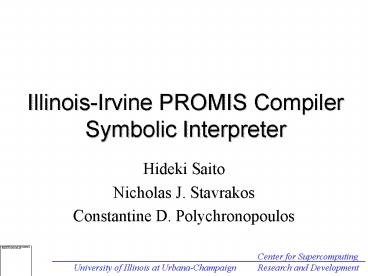IllinoisIrvine PROMIS Compiler Symbolic Interpreter - PowerPoint PPT Presentation
1 / 21
Title:
IllinoisIrvine PROMIS Compiler Symbolic Interpreter
Description:
Supports arbitrary precision data types. GNU MP (Multiple Precision) library ... No overhead for supporting arbitrary precision arithmetic ... – PowerPoint PPT presentation
Number of Views:24
Avg rating:3.0/5.0
Title: IllinoisIrvine PROMIS Compiler Symbolic Interpreter
1
Illinois-Irvine PROMIS CompilerSymbolic
Interpreter
- Hideki Saito
- Nicholas J. Stavrakos
- Constantine D. Polychronopoulos
2
Outline
- Symbolic Interpretation
- What is it?
- How does it work?
- Symbolic Kernel
- What can be done during interpretation?
- Interprocedural Aspects
- Performance Issues
3
Symbolic Interpretation
- Interprets program to discover properties of the
program - Maintains an environment of current execution
state as each line of code is interpreted. - Requires a tool to manipulate the symbolic
values variables take on during interpretation.
4
Interpretation Example
5
Encoding of Conditional Assignments
6
Symbolic Kernel
- Interpreter requires tool to manipulate
- Symbolic expressions
- Expressions containing the truth function t
- This tool is the core of the interpreter
- Needs to be fast
- Needs to be flexible
7
Symbolic Kernel
- Supports basic data types
- Supports arbitrary precision data types
- GNU MP (Multiple Precision) library
- Enables cross compilation for systems with
different intrinsic data types - (64,128)-bit integers
- Aribitrary precision floating point arithmetic
8
Symbol Class Definition
9
Uses of Symbolic Interpretation
- SSA Versioning
- Induction Variable Elimination
- Static Performance Prediction
- Range/Type/Constant Propagation
- Symbolic Dependence Analysis
- Strength Reduction
10
Symbolic Compiler
11
s-SSA Versioning
- Similiar to classic SSA, but constructed during
interpretation. - Allows for reevaluation of symbolic expressions
without reinterpreting entire program. - Potentially smaller SSA form (less versions) than
previous SSA algorithms
12
s-SSA Construction Example
13
Induction Variable Elimination
- Eliminate variables inside loops which contain
cross-iteration dependencies. - Computes closed form of variables using loop
variables or loop constants - Introduces expensive operations (, /), but
enables loops to execute in parallel - Opposite of strength reduction
14
Induction Variable Elimination Example
15
Strength Reduction
- Replaces expensive instructions ( , / ) with
less expensive instructions ( , -) - Introduces cross-iteration dependencies inside
loops, hence restricting parallelism - If loop is not parallel, probably better to use
simple instructions which introduce dependencies,
than expensive instructions with no dependencies
16
Strength Reduction Example
17
Static Performance Analysis
- Implemented with the aid of induction variable
analysis and range propagation - Compile time estimation of relative sizes of code
sections - Guides the ordering of transformations by the
compiler - Usefull for scheduling code sections
18
Interprocedural Aspects
- When interpreter encounters a function call it
must evaluate the function call and its effect on
the current environment - If function call only has a single call site,
then entire environment can be transfered to
function call for evaluation - If function call has multiple call sites then no
assumptions can be made about environment when
evaluating function call
19
Interprocedural Symbolic Interpretation
20
Performance Issues
- Memory Requirements
- Temporary file storage
- Speed
- No overhead for supporting arbitrary precision
arithmetic - User definable values for complexity of
interpretation
21
Conclusion
- Most analysis and transformation techniques can
use symbolic information (when necessary). - s-SSA enables retrieval of symbolic expressions
without reinterpreting entire program. - Implication IR support required to achieve best
possible performance from interpreter.

